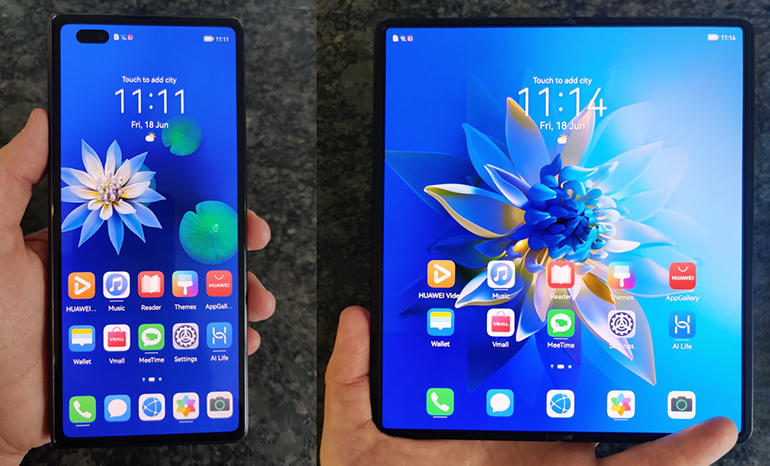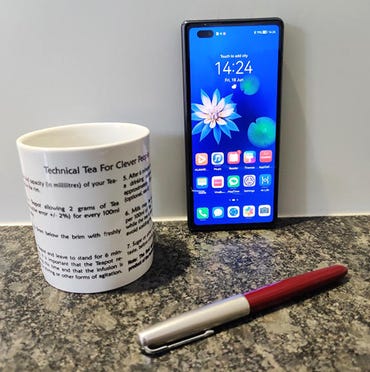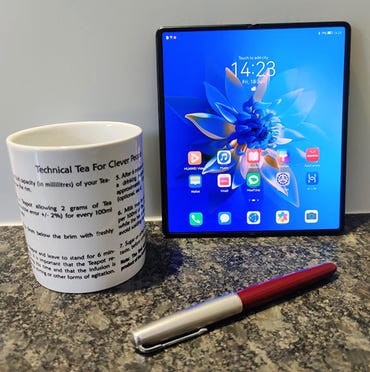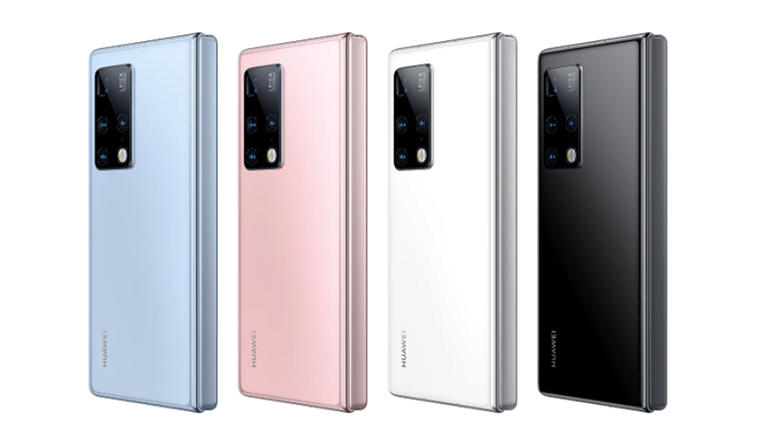Huawei Mate X2, hands on: A feature-packed foldable flagship Review | ZDNet
Huawei may have lost access to Google Mobile Services, but that hasn’t stopped the company pushing on with smartphones, building its own app store, and taking a generally bullish attitude. Its Mate 40 Pro, for example, a top-flight handset costing £1,099.99 (inc. VAT) at launch last year, sported a great camera, fast charging, a super screen, and some neat software features. But without key Google services, it was always going to struggle in the UK.
Once the world’s number-one smartphone vendor, Huawei (which no longer includes Honor), occupied seventh place in Q1 2021 according to analyst firm Canalys, shipping 18.6 million units worldwide. Meanwhile, top-placed Samsung shifted 76.5m phones in the first quarter. In its home China territory, Huawei was third in Q1 2021, behind Vivo and Oppo, with 14.9m units shipped.
What we have here is Huawei’s latest flagship folding smartphone, the 8-inch (interior), 6.45-inch (exterior) Mate X2.
The Mate X2 has not, at the time of writing, been given a UK release date or price, but currency conversions suggest that if, or when, it lands on our shores you shouldn’t expect much change out of £2,000.
The Mate X2 I was sent ran on a Chinese software version, so while I could set it to English language I don’t feel it’s fair to fully review and benchmark it. As a result, this is more of an extended hands-on preview.
Huawei is no stranger to folding handsets. Its Mate X appeared in November 2019, and was followed in March 2020 by the Mate Xs. These two previous handsets had a folding screen wrapped around the front and back of the phone, allowing you to open it out for a bigger view as required. The Mate X2, by comparison, looks at first like two phones hinged together down a long edge, with a camera array on the back and a standard (6.45in.) screen on the front. The hinge allows the two sections to open out and reveal the larger (8in.) folding screen. This more Samsung Fold-like design is an improvement because the large screen is protected when it’s not in use.

The Kirin 9000-powered Mate X2 has a 6.45-inch external screen, opening to reveal an 8-inch internal screen. Both are 90Hz OLED panels.
Images: Sandra Vogel / ZDNet
As you’d expect, the Mate X2 is big, heavy, and a bit unwieldy compared to a regular smartphone. It weighs 295g, and measures 161.8mm high. When folded it is 74.6mm wide and a maximum of 14.7mm thick. Unfolded, it is 145.8mm wide with a maximum thickness of 8.2mm, tapering on the outer screen section to 4.4mm.
There is a super-reflective finish to the glass back that, unfortunately, was very keen on grabbing my fingerprints, but that aside, build quality is excellent. This aluminium-frame phone is solidly built, with superb attention to detail.

Folded, the Mate X2 measures 161.8mm tall by 74.6mm deep by 14.7mm thick. It weighs a hefty 295g.
Image: Sandra Vogel / ZDNet
If the Mate X2 falls within your budget, you’ll get a handset with top-end specifications. The 5nm Huawei/HiSilicon Kirin 9000 SoC is blisteringly fast — every tap, every screen refresh was smooth and immediate. Naturally this is a 5G handset, and my review unit had 256GB of storage and 8GB of RAM. According to Huawei’s website a 512GB version will also be available. Internal storage can be boosted via Huawei’s proprietary Nano Memory (NM) cards, which share one of the handset’s two SIM slots. There is a fingerprint sensor in the side-mounted power button.

Unfolded, the Mate X2 is 145.8mm wide with a maximum thickness of 8.2mm.
Image: Sandra Vogel / ZDNet
The Mate X2’s 4500mAh battery might prove a weak point in everyday use, depending on how much you use the massive 8-inch inner screen. I didn’t feel a formal battery rundown test was a fair test at this stage, but I did find that consistent use of the inner screen was, as expected, hard on the battery. For example, a half-hour video stream to the large screen took 7% of charge from the battery. Fast charging will clearly come in handy, but there’s no support for wireless charging. I hope to do formal battery tests with a final version of the handset, at which time I’ll run other performance benchmarks.
The core software is Android 10 (minus Google Mobile Services), with Huawei’s EMUI 11 on top. This includes Huawei’s AppGallery, plus music, video, wallet, health and other apps. There were some Chinese apps on my review unit, for example, which will obviously not be present on a UK phone, but it looks as though Huawei will take the same approach it has with recent Google-free phones in terms of providing its own applications.
There are four rear cameras: 50MP f/1.9 wide angle; 16MP f/2.2 ultra-wide angle; 12MP f/2.4 telephoto (3x optical zoom); and 8MP f/4.4 super-zoom (10x optical zoom). All bar the ultra-wide angle camera feature optical image stabilisation (OIS). On the front, in an in-screen lozenge is a 16MP f/2.2 selfie camera. There’s no camera on the inner screen, but it can be used to frame shots taken with the main camera array (the camera software automatically detects whether you want to use the outer or inner screen for this purpose).
The outer screen is a very serviceable 6.45-inch OLED panel with 2700-by-1160 (456ppi) resolution, a 90Hz refresh rate and a 240Hz touch sampling rate. This is fine for many tasks, but inside there’s an 8-inch OLED screen with 2480-by-2200 (413ppi) resolution, 90Hz refresh and 180Hz touch sampling rate.
The inner screen sits in quite large bezels by today’s standards, but that doesn’t present a usability issue and image quality is simply superb. It’s not quite square, with edges measuring 13.5cm and 15.5 cm. The screen rotates through all four possible orientations, so you can easily select the slightly wider or slightly taller option It can be divided into two, displaying what in effect are dual front-screen-sized windows, allowing you to, for example, read a website on one side with social feeds ticking over on the other.
The hinge mechanism is smooth as silk. I was not the first to see the sample I was sent, and repeated opening and closing of the handset had resulted in a bit of unevenness in the screen around the hinge area, creating a bumpy surface visible when the screen was off, but not when it was switched on, so the overall viewing experience was not hampered. The effects of longer-term usage are impossible to know at this stage.

Huawei Mate X2 colours: Crystal Blue, Crystal Pink ,White, Black
Image: Huawei
Conclusions
The Huawei Mate X2 is an astounding device, with top specifications, a solid build and an 8-inch inner screen that’s simply amazing. It is likely to command a very high price when it launched outside China, and will still be hampered by the absence of Google Mobile Services. It’s also relatively heavy and, although I didn’t do a formal battery rundown test, I fear battery life might be a key downside.
RECENT AND RELATED CONTENT
Samsung Galaxy Z Fold 2 review: Foldable perfection nearly achieved
Huawei first quarter sales down 16.5% thanks to Honor sale
Huawei continued to earn profit in 2020 but did not see growth outside of China
Huawei Mate 40 Pro, hands on: An excellent 5G flagship, but Google is still overboard
Huawei Mate 40 series: Flagship phones with limited appeal outside China
The best phones in 2021: Best overall, foldable, stylus, and more
Read more reviews
For all the latest Technology News Click Here
For the latest news and updates, follow us on Google News.

